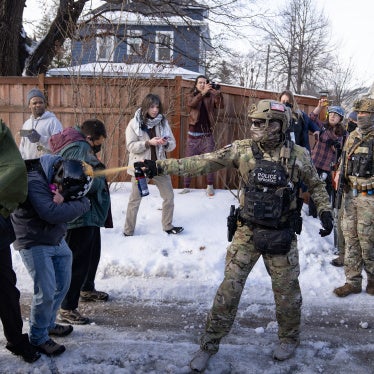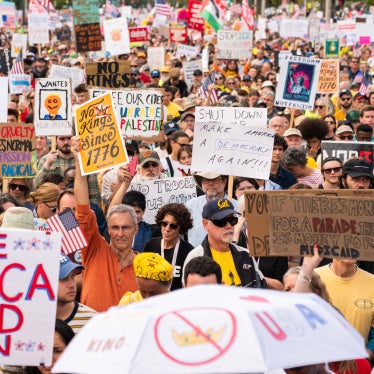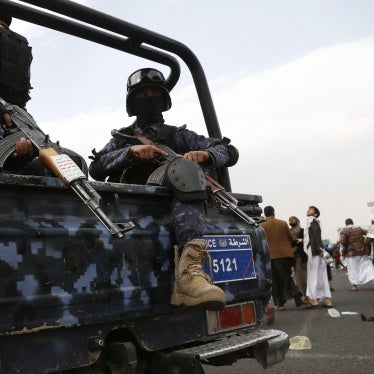As an 18-year-old college sophomore, I voted for Alberto Fujimori for president of Peru in 1995. By then, Fujimori, a relatively unknown agronomy professor elected in 1990 in a closely contested runoff against the novelist Mario Vargas Llosa, had already turned into an autocrat, though I didn’t fully understand that at the time.
When Fujimori was first elected, the country had been embroiled in an internal war with the Maoist Shining Path insurgency for over a decade, and tens of thousands — mostly poor indigenous people — had died or disappeared at the hands of either the guerrillas or the military. Lima, the capital, where I lived, had largely escaped the violence, but in the early 1990s, we were increasingly experiencing blackouts due to Shining Path’s bombings of electric towers.
The country was also in a deep economic crisis, with runaway “hyperinflation” that drove prices up, while the value of earnings and employment dropped precipitously.
The crises combined with general dysfunction: long lines to pay bills, rampant tax evasion, routine requests for bribes from police officers and other officials, not to mention poverty, lack of access to basic services, and deeply entrenched inequality. All of that had fueled widespread cynicism about government.
Fujimori presented himself as an outsider who was shaking things up, a strong leader who would impose order. Congress, he said, was obstructing him; the courts were no good either. Many Peruvians wanted to believe him — or at least hoped he would be better than the ineffective alternative.
So when, in 1992, tanks rolled into Lima and Fujimori announced on TV he was shutting down Congress, with military backing, many citizens supported him. I was appalled at the news. But within a few months, I started to come around.
One night in September 1992, I glanced out the window and saw the sky light up a reddish orange, before I heard and felt the boom of a car bomb set by Shining Path on Tarata Street, in a residential area. Twenty-five people died and about 150 were injured. My parents had been on that street just a few hours earlier. It was one of several Shining Path attacks in Lima that added to the sense of chaos and fear, and played in Fujimori’s favor.
That December, Fujimori appeared on television with a heavy-set bearded man in a striped prison suit, in a cage. It was Abimael Guzmán, the Shining Path leader, whom police had finally tracked to a safe house in Lima and arrested. In the following weeks and months, the insurgency — which had an unusually top-down structure — largely fell apart as police arrested additional leaders.
When Fujimori held new elections for Congress in 1993, his party got a majority. He also put a new constitution in place.
In 1995, the economy seemed to have stabilized, though many suffered from the government’s harsh austerity measures, and the Shining Path seemed to be done with. Going along with the mood of many people around me, I credited Fujimori for the progress and voted for him. I looked away from his contempt for democratic institutions and paid little heed to news reports about killings of civilians and death squads.
That was a grave mistake. Fujimori had already taken apart the country’s system of checks and balances — he had a Congress and courts, but knew that he didn’t have to respect them. In the following years, when the Constitutional Court held that he could not run for a third term, he removed the justices who were in his way. It was a simple action that revealed the truly autocratic nature of a regime that claimed to be democratic. And when he started to lose control of Congress through elections, his intelligence chief, Vladimiro Montesinos, paid members piles of cash to vote with him.
Fujimori and his cronies bought off officials with a huge slush fund of stolen government money. They also bought off large numbers of tabloid papers to serve as mouthpieces for the government, and to discredit and attack the mainstream media. Critics and activists were dismissed as part of the discredited “left” — or worse, as “terrorist” sympathizers.
Meanwhile, in its effort to look tough on terrorism, the government rounded up hundreds of innocent people, charging and convicting them of crimes they did not commit, in systems lacking basic due process. Two months after his 1995 reelection, Fujimori also signed an amnesty law letting the “Grupo Colina,” a government-sponsored death squad responsible for two massacres of civilians and other atrocities, off the hook for their crimes.
By the time I left the country in late 1996, I had started to realize that the government I had voted for had become an organized criminal enterprise, devoted to perpetuating its hold on power and lining the pockets of its members, while trampling on basic rights. The country maintained a veneer of democratic legitimacy, but it was really a kleptocracy run by a strongman.
When I got to the United States, I had high expectations. My American father had been away from the country for decades, but had always talked about the United States as a society that had strong values: democracy and the rule of law.
Of course, I knew the United States was not perfect — not by a long shot, with its history of racism and discrimination, its mass incarceration, its harshness toward low-income people. But when I was in law school in the late 1990s, there seemed to be a vigorous movement to address injustices, and a belief that progress could be accomplished through the courts or legislative reform.
People had serious debates about what the Constitution meant — and it mattered. Nobody seemed to think the president could one day just ignore the separation of powers, or persecute the media. After all, everyone knew about the First Amendment’s protection of free speech.
Over time, many of the weaknesses in the system became more evident to me. After the September 11 attacks, many people in the United States understandably wanted a swift response from the government. But that meant — in echoes of what happened in Peru under Fujimori — that many turned a blind eye to government abuses. Strong US institutions didn’t keep the administration from committing torture, in direct violation of US law, or from distorting international law beyond recognition to justify putting hundreds of people in indefinite detention without charge. The courts fell far short of stopping the abuse.
The Obama administration had an opportunity to address those abuses by ending indefinite detention in Guantanamo and holding those responsible for torture to account. But it was too slow to act, allowing Congress to enact laws — which the president failed to veto — creating significant obstacles to closing the detention facility. And while Obama ended the CIA’s torture program, he also made clear that he thought the country should “look forward,” not back. Unfortunately, the dangerous message he sent by failing to support prosecutions was that if officials in future administrations broke the rules, they would get away with it.
At the same time, the ever-larger sums of money pouring into politics inevitably raised questions about the meaning of democracy and the line between political expression and corruption. The growing polarization in society, particularly evident in the rise of the Tea Party and certain media outlets, meant that people in the United States no longer felt part of the same conversation about values. They took part in parallel, starkly opposed conversations on either side of a wide political divide.
Yet, in 2016 the United States still looked more stable, more resilient, more respectful of the rules and basic democratic values, more open to diversity of voices than other places in the world that have succumbed to autocracy or large-scale corruption.
But then Donald Trump became president.
Now, US democratic values and institutions seem to be in jeopardy in a way they haven’t been in recent memory. Trump sounds a lot like demagogues in other places. There is the constant propaganda about “fake news” and the effort to tar respected and serious media outlets as dishonest or somehow un-American. There’s the divisive rhetoric and scapegoating of vulnerable groups: the so-called “bad hombres,” refugees, Muslims. There are the personal attacks on judges who rule against him. There’s the railing about voter fraud, an imaginary problem being used to justify new efforts at vote suppression.
Trump’s failure to fully disengage from his businesses, his use of family members in senior government positions, and his lack of transparency about his finances raise questions about the extent to which members of his cabinet, his inner circle of advisors, and his family might profit from his government’s policies.
And now there’s his firing of FBI Director James Comey, in the midst of an FBI investigation into the Trump presidential campaign’s possible collusion with Russia, in their attempt to derail Hillary Clinton’s bid for the office. That decision is starkly reminiscent of Fujimori’s decision to simply get rid of the constitutional justices who ruled against his ability to run for a third term.
There are differences between Trump’s United States and Fujimori’s Peru, since the courts are still doing their job, reviewing challenges to Trump’s policies, and in some cases ruling against him. The executive branch appears to have complied with adverse rulings. The media is showing few signs of being cowed, though it has decreased access to the executive branch.
The public is mobilized, with record numbers of lawyers and law students volunteering to represent immigrants, millions turning up for protests, Senate office phones ringing off the hook, and new organizations cropping up all the time to channel public discontent about various issues.
The Senate has approved Trump’s nominees so far, and Congress seems poised to go along with many of his initiatives. But his party’s own internal divisions, and strong opposition from the Democratic party, have so far served as at least a partial check on the president’s power to push through his legislative agenda.
But we can’t take all of that for granted. The dismantling of democratic institutions can happen gradually, through an accumulation of blows rather than in one fell swoop. If the Senate fails to do its job and Trump gets to appoint an FBI director he can control, if Attorney General Jeff Sessions’s weakening of civil rights protections opens the door to increased voter suppression, if Trump starts testing the limits of what he can get away with in the face of adverse court rulings, the US system of government could over time look very different.
And if there’s a traumatic event — a terrorist attack, a war — that could change the dynamics of public opinion. Would sectors of the public no longer want to hear critical reporting? Would fear once again lead people to ignore rights and values as it did after the September 11 attacks in the United States, and in the days of Shining Path in Peru?
I hope not. But even if it does, and even if the United States goes down a much more abusive, autocratic path than it has before, my experience in Peru has shown me something else: there are ways out.
In November 2000, Fujimori resigned in the midst of a major scandal due to the release of videotapes showing his intelligence chief paying off members of Congress. In the following years, independent prosecutors, sometimes relying on information that persistent journalists and activists had been compiling over years, built strong cases against Fujimori and his entourage. Today, the former president is in prison for crimes against humanity and multiple corruption-related offenses. Peru still suffers from many problems, including corruption, but autocracy is not one of them.
With the vibrant press, courts, activists, and officials who firmly believe in rights and democratic principles in the United States, I know there will be people who will stand up to any efforts to undermine them. As long as they are around, we have good reasons for hope.









